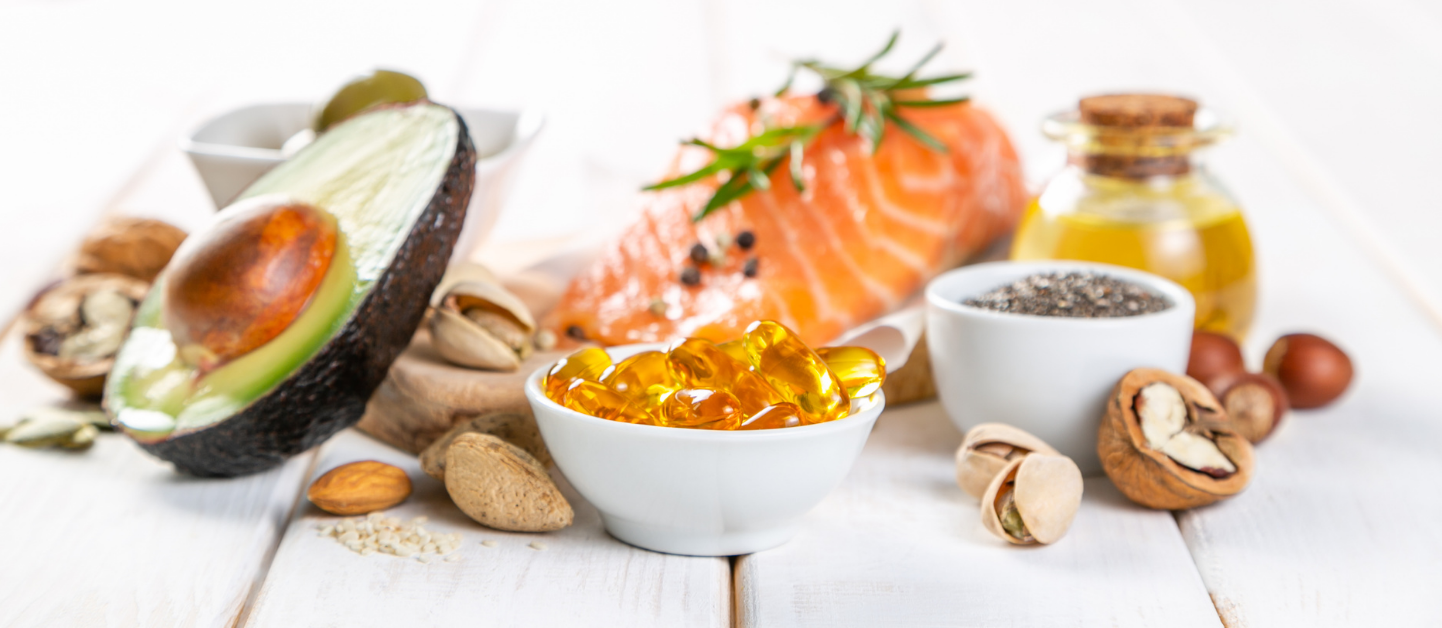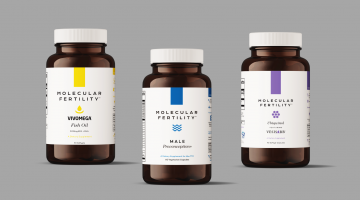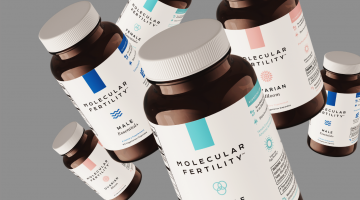Fish Oil (Omega-3s) for Fertility: Benefits, Dosage, Best Sources, and Supplements
We discuss topics in articles we think are useful. If you purchase recommended products, services, or treatments, it may financially benefit CNY Fertility and its owners. Read more about our financial relationships here.

Omega-3 fatty acids found in seafood, algae, nuts, and fish oil supplements support many core functions in the body. Research also shows they play a meaningful role in reproductive health and may improve fertility outcomes for both men and women.
- For women, omega-3 fatty acids may support egg quality, delay ovarian aging, improve pregnancy rates, and help support healthy fetal growth and development.
- For men, omega-3s have been linked to improved sperm count, motility, morphology, and DNA integrity.
Because most of us don’t consume omega-3-rich foods consistently, when we’re trying to conceive, we have to rely on omega-3 supplements such as purified fish oil or vegan algal sources of EPA and DHA.
This guide explains how omega-3s support fertility, how much to take daily, the best food and supplement sources, and how to choose the best omega-3 supplement for fertility.
Fast Facts
- Omega-3s play a vital role in the structure and formation of all human cells (including eggs and sperm) and have a wide range of health benefits.
- The American Heart Association (AHA) found that the majority of the U.S. population does not meet recommended daily levels of omega-3s. The AHA recommends using supplementation in addition to food sources to meet appropriate omega 3 levels.
- General intake recommendations range from 250 to 500 mg per day for adults, but many fertility specialists recommend 1,000 to 2,000 mg or more depending on goals
- Omega-3 supplementation may improve sperm count, motility, and morphology.
- Omega-3s may protect against the age-related decline in female fertility and support healthy egg quality.
- There are many Omega-3 supplements with differing quality. Look for purified fish oil supplements with a high concentration of omega-3s like those by Molecular Fertility.
What are Omega-3s?
Omega 3s are fatty acids that are a vital source of fat and energy for our bodies. Omega-3s must be consumed through diet or supplementation. Our bodies cannot naturally produce them.
Omega-3s play an essential role in cell structure and function .
Cells with higher omega-3 content have:
- better nutrient exchange
- healthier electrical signaling
- more efficient cell communication
Additionally, Omega-3s help the body regulate:
- the nervous system
- blood pressure
- hemostasis
- glucose tolerance
- immune/inflammatory processes
Omega-3s and Reproductive Cell Health
Omega-3s are part of the membrane structure of both sperm and egg cells. Higher omega-3 levels are associated with better cellular integrity and function.
Male Fertility Benefits of Fish Oil and Omega-3s
Numerous studies show a clear pattern: Men who consume more omega-3 fatty acids, either through diet or supplements, tend to have healthier sperm.
This includes:
- better sperm count
- stronger motility (movement)
- improved shape (morphology)
- better DNA integrity
In a clinical trial from 2024, infertile men who took 2,000 mg of omega-3 daily for 12 weeks
- saw their sperm count more than triple
- 77% of the participants moved from the infertile range into the normal range.

A 2011 controlled study found that taking 1.8g of omega-3 supplements for 32 weeks significantly improved several semen parameters.

Observational studies also show that men who regularly eat omega-3 rich foods, such as salmon, sardines, oysters, and walnuts, tend to have higher-quality sperm compared to those who eat very little.
And a 2019 review combining results from 12 trials found consistent benefits in sperm count, motility, and morphology across the majority of studies.
How Omega-3s Support Sperm Health
One reason omega-3s may help is that they reduce inflammation and support antioxidant defenses.
Oxidative stress and inflammation are known to
- damage sperm cells
- reduce movement
- impair DNA quality.
Omega-3s also make up part of the sperm cell membrane, so higher levels can make sperm more flexible and better able to swim and fertilize an egg.
The Takeaway
Omega-3s appear to support sperm health by improving structure, movement, antioxidant protection, and overall semen quality, making them a promising nutritional tool for men trying to conceive.Omega-3 Fish Oil and Female Fertility
As in men, studies in women show a consistent pattern: women with higher omega-3 intake tend to have better reproductive outcomes.
This includes:
- healthier hormone balance
- more regular ovulation
- improved egg quality
- higher pregnancy and live-birth rates
Ovulation and Hormone Balance
A study published by the American Society for Reproductive Medicine found that women who consumed higher amounts of omega-3 fatty acids were more likely to ovulate regularly and had healthier reproductive hormone patterns, including estrogen, progesterone, and follicle-stimulating hormone (FSH).
Higher Pregnancy and Live-Birth Rates
In a 2018 study of women undergoing assisted reproductive treatment, researchers found that higher blood levels of omega-3s were strongly associated with better outcomes. For every 1% increase in omega-3 levels in the blood, clinical pregnancy and live-birth rates increased by approximately 8%.
Slowing Age-Related Decline in Egg Quality
Female fertility naturally declines with age, especially after 35. Research suggests omega-3 fatty acids may help slow this decline.
A 2012 study found that long-term omega-3 intake supported healthier ovarian aging, and short-term supplementation later in life was associated with improved egg quality in women approaching advanced maternal age.
Omega-3s During Pregnancy
Omega-3 requirements increase during pregnancy because DHA, in particular, plays a vital role in fetal development. Multiple studies show that omega-3 supplementation during pregnancy supports :
• fetal brain and nervous system development
• infant retinal development
• full-term birth outcomes
• postpartum mood balance
• healthy infant cognitive development
Many pregnant women fall short on omega-3 intake because fish consumption is often reduced during pregnancy due to concern about mercury exposure. For this reason, purified fish oil or algal-based DHA is often recommended to ensure adequate levels without contaminants.
Why Omega-3s May Help
Omega-3s appear to influence female fertility through several mechanisms:
• reducing inflammation that may interfere with ovulation and implantation
• supporting hormone production and signaling
• improving ovarian and follicular cell structure
• supporting mitochondrial energy, which is critical for egg development
• increasing antioxidant defenses to protect eggs from oxidative damage
The Takeaway
Omega-3s may support multiple aspects of female fertility, including ovulation, egg quality, hormonal regulation, and pregnancy outcomes. They also play a key role during pregnancy to support healthy fetal development. Because most women do not meet omega-What is the Ideal Omega 3 Level?
An exact recommended daily allowance for omega 3 fatty acids has not been established. Most health organizations recommend that healthy adults consume between 250-500mg of omega 3s daily. However, fertility specialists or medical providers who are often recommend an omega 3s dosage of over 2,000 mg daily.
The American Heart Association (AHA) reports that the majority of the U.S. population does not meet recommended daily levels of omega 3s. As such, the AHA recommends using supplementation in addition to food sources to meet appropriate omega 3 levels.
There is no established limit for the amount of Omega 3s one should consume in a day, but the FDA recommends that daily intake not exceed 3000mg. Still, many practitioners recommend higher doses.
| Organization or Source | Suggested Daily Intake | Notes |
|---|---|---|
| General Public Health Guidelines | 250–500 mg/day | Standard recommendation for healthy adults (EPA + DHA combined). Sources: EFSA, U.S. Dietary Guidelines, NIH. |
| Fertility and Reproductive Medicine Providers | 1,000–2,000+ mg/day | Higher intake commonly recommended to support egg and sperm health, reduce inflammation, and support hormone regulation. |
| American Heart Association | No fixed dose, but encourages supplementation if dietary intake is insufficient | Based on population data showing most adults fall short of omega-3 needs. |
| FDA Upper Safety Guideline | Do not exceed 3,000 mg/day (from food + supplements) | Intake below this level is generally considered safe for healthy adults. |
What Factors Influence Recommended Omega 3 Levels?
One other factor to be mindful of when considering how many omega-3s you should consume daily is the amount of omega-6s you are consuming.
Omega-6s are found in most processed foods, seed and vegetable oils, and more. They compete for the same enzymes as omega 3s, which are required to convert them into their biologically active forms.
Research indicates that the amount of omega 6s consumed in the typical Western diet is six times that of the amount of omega 3s. However, many dietary specialists believe that the ideal ratio of omega 6s to omega 3s is closer to 2:1.
How to Increase Omega-3 Levels
To ensure appropriate omega-3 levels, consider eating fatty fish at least twice per week and potentially supplementing with fish oil omega-3 supplements on days you’re not consuming fatty fish.
Fish Oil from Diet
The best way to ensure appropriate omega-3 levels through diet is by eating fatty fish like salmon, tuna, and herring. However, it is important to be mindful of mercury levels when eating fish, especially larger, longer-lived species such as swordfish and fresh tuna. Fish oil can also be found in seafood like oysters, caviar, cod liver oil, and other types of fish like mackerel, herring, and anchovies.
Seeds and nuts like flax seeds, chia seeds, and walnuts also contain omega-3s but primarily as ALA, which may be inferior to EPA and DHA when it comes to supporting human health and fertility.
Check out the chart below for a list of foods and their omega-3 levels:
Food | Serving Size | Amount of Omega-3s |
| Mackerel | 100 grams | 5,134 mg |
| Salmon | 100 grams | 2,260 mg |
| Herring | 100 grams | 2,366 mg |
| Sardines | 100 grams | 1,480 mg |
| Oysters | 100 grams | 435 mg |
| Flax Seeds | 10.3 grams | 2,350 mg |
| Chia Seeds | 28 grams | 5,060 mg |
| Walnuts | 28 grams | 2,570 mg |
Data provided by the United States Department of Agriculture (USDA).
Fish Oil and Omega-3 Supplements
Many studies support the efficacy of omega 3 supplementation in addition to a healthy diet to support both male fertility and female fertility.
Supplements are a great way to ensure appropriate omega 3 levels for vegetarians, vegans and those individuals who don’t eat fish regularly.
Taking fish oil or omega-3 supplements also decreases (depending on the brand of supplements) your chance of exposure to toxins and contaminants found in some fish.
Concentrated omega-3 supplements also have higher levels of omega-3s and very low amounts of omega-6s. This can help to balance the ratio of omega 3s to omega 6s which has been shown to have a significant impact on overall and fertility health.
From a quick search on the web or by taking a trip to your local supplement store, you’ll see many fertility supplements, fish oil, and omega-3 supplements available.
Choosing a Fish Oil (Omega 3) Supplement
At CNY Fertility, we recommend Molecular Fertility Supplements to all of our patients.
Molecular Fertility offers two supplements containing Omega 3s, VIVOMEGA™ FISH OIL and Vegan Omega 3 Algal Oil.
Both supplements are designed to support healthy sperm motility, structure, and function, egg quality, fetal development, and overall health.

One serving of Molecular Fertility’s VIVOMEGA™ FISH OIL delivers 6 times the omega-3s (over 2,000 milligrams per serving) found in typical over-the-counter fish oil supplements. VIVOMEGA™ FISH OIL is derived from non-GMO fish and surpasses all international fish oil standards for purity, freshness, and oxidation.
For our vegetarian and vegan friends, or those just looking for a natural source of omega-3s derived from algae instead of fish, we recommend Molecular Fertility’s Vegan Omega-3 Algal Oil. Molecular Fertility’s Vegan Omega 3 Algal Oil contains over 800 mg of Omega 3s per serving and is a completely vegan/plant-based product.
Omega-3s Impact on Male Fertility and Female Fertility:The Bottom Line
Omega-3s from food and fish oil supplements have been shown to support overall health and fertility. For females, fish oil supplementation may help improve egg quality, delay ovarian aging, improve pregnancy rates, and support healthy fetal and infant development. For males, omega-3 supplementation may improve sperm count, motility, and morphology.
Fish oil is just one of many fertility supplements and male fertility supplements that can help to support a fertility diet and naturally improve your fertility.




